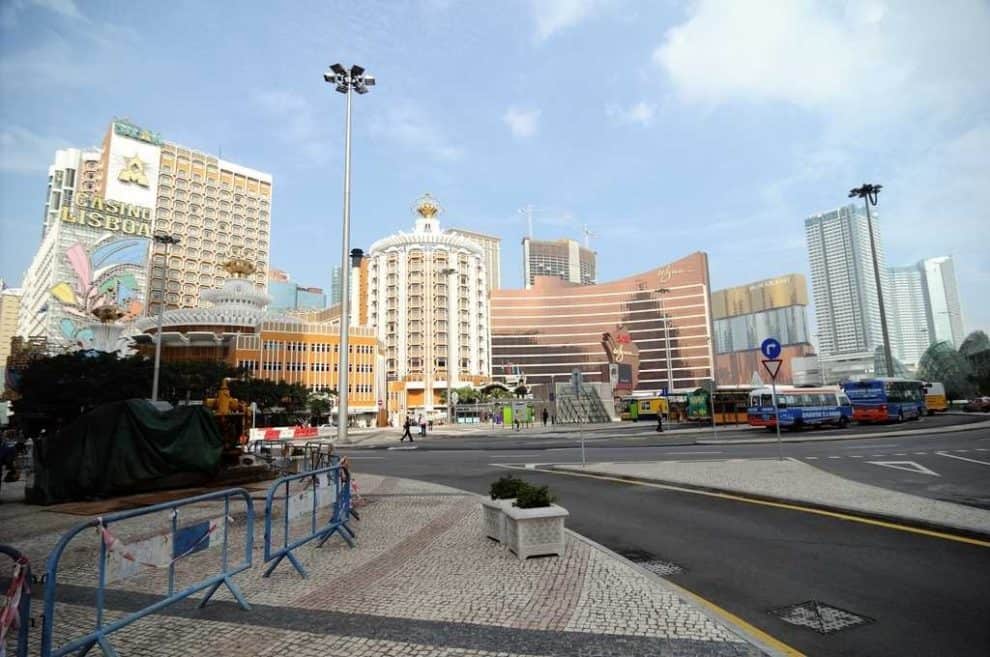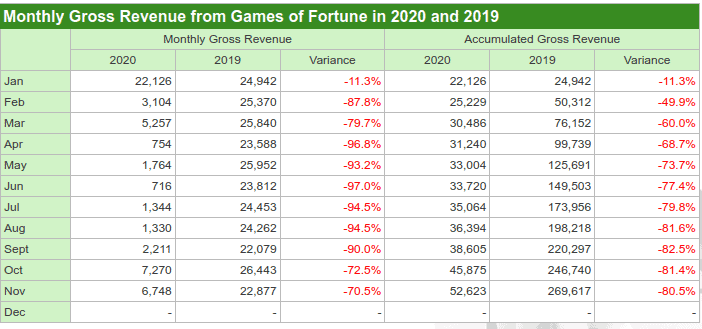
- Macau has been hit hard by the COVID-19 pandemic.
- In particular, they’ve been hurt by travel restrictions from mainland China.
- Macau’s gaming revenues have shown a slow but steady rebound since an all time low in June.
With several companies preparing COVID-19 vaccines for market there is finally some ‘light at the end of the tunnel’ for the world’s economy. Some semblance of normalcy can’t come soon enough for the travel industry in general and the gaming industry in particular. Although smaller, regional gaming properties throughout the US and ‘locals casinos’ in Nevada have fared reasonably well any destination that requires travel to get there has been devastated. This has been true not only in Las Vegas but in the world’s largest gaming jurisdiction, Macau.
The Macau Gaming Inspection and Coordination Bureau (DIJC) serves as the oversight body for the casino industry in the Chinese Special Administrative Region and they’ve just released revenue figures for the month of November. The numbers provide something of a ‘glass half full/glass half empty’ view of the state of the gaming economy. On the plus side–since a historical low in June when Macau experienced a year over year decline of 97% revenues have shown improvement every month since. The bad news, however, is that the numbers remain ugly.
Here’s the chart of YTD revenues broken down by month from the DIJC website. Revenue figures are reported in Macanese Pataca which has the charming abbreviation ‘MOP’. At current exchange rates, 1 Macanese Pataca aka MOP is worth 0.13 USD. Here’s a helpful tip–if you want to plug these revenue figures into a currency exchange you’ll need to add ‘000,000’ to the back end of the numbers reported below. Although the graph below indicates that 1 MOP = 1.03 HKD (Hong Kong Dollar) the current exchange rate as of this writing is 1 MOP = 0.98 HKD:

Pretty easy to see when gaming revenue started to nosedive as the COVID-19 pandemic worsened in Asia followed by the rest of the world. It looked like everything hit hit rock bottom in April which was followed by a slight uptick in the month of May but that wasn’t the case. In June, Macau experienced their worst month in history–casinos brought in only $89.7 million USD for a 97% drop from June 2019.
Although Macau got a decent handle on the COVID-19 pandemic by the middle of summer the revenue picture didn’t improve much due to travel restrictions imposed by the Chinese government. The borders of Guangdong province and Hong Kong were closed and these areas represent Macau’s largest customer base. The Chinese government began to relax these restrictions in August and that’s when you can see the start of a gradual improvement. Although travel from the Chinese mainland started slowly after the borders were reopened in the past couple of months Macau’s revenues have started to show some decent momentum. The hope is that this positive trend will continue with travel restrictions into Macau being relaxed further in late November.
Even so–the revenue figures for the month and YTD are almost unimaginably ugly. The state of the world tourism and gaming industries are such that we’re talking about a 70%+ drop year over year as a positive. Ouch. For the year, revenues are down -80.5% and that’s a nearly unfathomable decline–at least from the perspective of the pre-COVID era. Between January and November of 2020 the 41 casinos in Macau held $6.589 billion (USD) compared to $33.758 billion (USD) in January through November 2019. The 70.5% drop was a disappointment to gaming industry analysts who expected a decline of between 60% and 65%.
While much of Europe and North America continues to struggle with the COVID-19 pandemic the virus has essentially been eliminated from both mainland China and Macau. The 7 day moving average of new cases in mainland China is 15.6–a statistically insignificant number in a country with a population in excess of 1.4 billion. Macau hasn’t had a new case of COVID-19 confirmed since late June. In fact, Macau is frequently offered as an example of a COVID-19 success story as the district has reported a total of just 46 confirmed cases, all of which have recovered. This has been a cause for some consternation in the Asian business media with the big question being ‘when will Chinese tourists return?’









